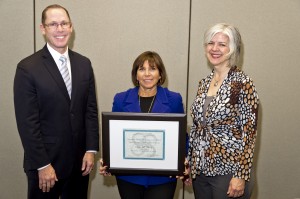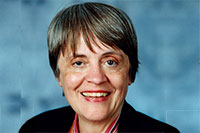
Professor Susan Brody (center) displays the plaque she received at the American Association of Law Schools meeting honoring her outstanding work as director of the Lawyering Skills Program at The John Marshall Law School. She is congratulated by Professor Anthony Niedwiecki (left), current program director, and Professor Maureen Straub Kordesh, a past director.
The outstanding work of students and faculty continues to bring national recognition to The John Marshall Law School Lawyering Skills Program.
The most recent recipient of this recognition is Professor Susan Brody, the first director of the Lawyering Skills Program, who was honored at the annual meeting of the American Association of Law Schools, Section on Legal Writing, Research, and Reasoning in January 2012. Brody was presented with the Section Award for her many initiatives that helped develop the program into an academic powerhouse.
The Lawyering Skills Program, ranked by US News and World Report as one of the top 10 programs in the country, is much more than an ordinary legal writing program. It is designed to immerse students in analysis, writing, research, advocacy and drafting over several semesters.
“We’re teaching students to think about their thinking; think about their writing. The program has depth in addition to breadth,” said Professor Maureen Straub Kordesh, another past director.
When students enter the mandatory four-course Lawyering Skills Program, they are given training that takes them from a novice writer to a legal writer of persuasive briefs. Over the four semesters, they learn how to engage in the lawyering skills required of a first-year attorney, with a focus on writing in a succinct, thorough and persuasive way.
The writing skills are supplemented with online research techniques, and instruction on a plethora of documents—from wills to real estate closing papers to a piece of legislation. Computers have changed the operations of the law office, but Anthony Niedwiecki, current director of the program, said John Marshall students are taught both book and online source research, and professors are developing learning modules for a wider range of databases. Students also learn how to do electronic court filings.
“The idea is to walk out of John Marshall being exposed to typical documents a lawyer would be asked to draft,” explained Niedwiecki.
A survey of alumni and their employers Niedwiecki conducted has shown that John Marshall graduates are well prepared for their careers. Responses to the survey overwhelmingly highlighted the preparation of the John Marshall graduates, describing the graduates as self-starters, well-trained and able to handle the demands of law practice.
Niedwiecki credits Brody with laying a strong foundation back in 1984 when then Dean Leonard Schrager asked her to establish a writing program that would encompass all aspects of the law school’s curriculum. At the time, various facets of writing were being taught, but there was no cohesiveness or structure.
“I think it says much that the faculty accepts and appreciates the Lawyering Skills Program and understands its critical and important nature in the curriculum,” Brody said.
Brody, Niedwiecki and Kordesh agree John Marshall’s Lawyering Skills Program has always been looked at in the legal writing community as “doing the next new thing” and providing a model for other schools to follow.
For example, it was Brody who knew students needed a mentor to help them establish their writing skills, so she developed the first Writing Resource Center before other law schools understood its importance. Students today write and receive detailed critiques on several assignments in each Lawyering Skills course, as well as work with attorneys in the center who work with students in 30-minute sessions. Few law schools have anything close to what John Marshall offers its students, Niedwiecki said.
Brody also expected much of her Lawyering Skills colleagues. Under her direction, John Marshall was one of the first law schools, and even today may be one of the few law schools, to have tenured and tenure-track faculty teaching legal writing.
When Brody got the program up and running, she co-wrote and edited “Legal Drafting,” one of first textbooks on drafting various legal documents. She also was a contributing author to the “ABA’s Sourcebook on Legal Writing Programs,” which remains the main authority on how legal writing should be developed.
Brody’s pioneering spirit has continued with each subsequent director of the program. Kordesh expanded the program developing specialty writing courses building on the expertise in the law school’s six Centers for Excellence. Meanwhile, the law school has taken the lead in incorporating international skills education for its foreign students, and has shared its experience through the Global Legal Skills Conference.
The law school also is leading the legal academy in the ways that it assesses the learning of its students. Because all students participate in the Fred Herzog Moot Court Competition, Niedwiecki is developing a way to evaluate their work to determine what is working in the writing program, and which courses may need some tweaking. Niedwiecki sees this improved student assessment as John Marshall’s latest cutting-edge development.
Pointing to the success of John Marshall’s Moot Court Program, Niedwiecki stated that “one of the best indicators of our success is the number of ‘Best Brief’ awards our students win at moot court competitions across the country.”


